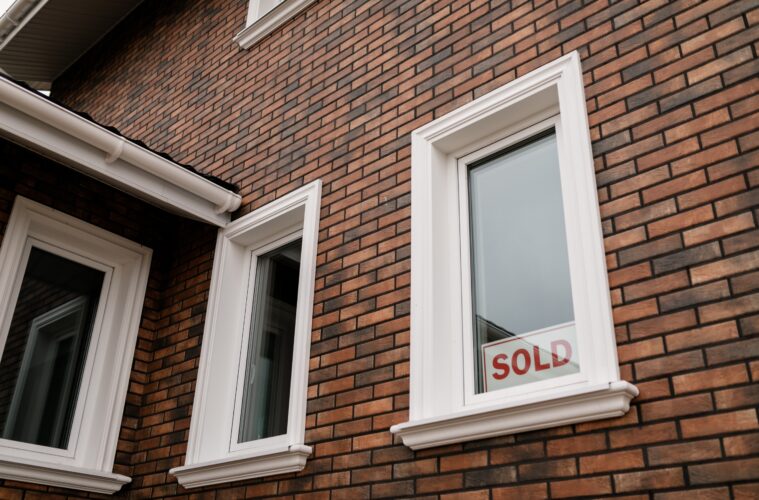Selling your home is, potentially, even harder than buying one. When you’re buying, you at least have some control over the situation in that you decide the type of house you want, you can browse and look around, then make a bid. It’s still stressful, but you have more to do that’s within your control, so it feels achievable.

When selling, a lot of the process is taken out of your hands. What we mean is that you list your home for sale, then you play the waiting game. You can sit around for weeks or months before someone inquires about the property. It feels like you’re finally getting somewhere, but after viewing, they’re no longer interested. This lack of control can be very frustrating and lead to a great deal of stress.
Typically, there are two different ways you can sell a property. The traditional method is to find an estate agent and have them take care of everything. Whether you go directly to the estate agent’s office or work via a real estate brokerage, the process is the same. Your agent will help you list your property and find buyers for it. This can be highly advantageous, but there’s one big thing that some people find irritating: the fees. Estate agents have to be paid somehow, and they get a cut of your sale, along with some additional fees. It led many people to opt for the second way of selling a home: all by yourself.
In this guide, we’re going to explain everything you need to know about selling on your own. As we talk through some of the pros and cons of this approach, you’ll also learn a bit about selling through an estate agent. When you reach the end of the guide, you should know which method makes the most sense for you!
How do you sell your house with no agent?
Traditionally, you’ll use an estate agent to get your property on various websites and to advertise it to the masses. They’ll also help you take photos and prepare your property in the best way possible, making it desirable. So, if you remove them from the picture, how will you go about selling your home?
- Step 1: Get a valuation – It begins by understanding how much your home is worth. You can do this by looking at different property sites and seeing the average price of similar homes in your area. Of course, for a more accurate valuation, it pays to call an expert in to survey your house and stipulate how much they think it’s worth. At this stage, it’s also worth getting any essential certificates you need, like an energy performance one.
- Step 2: List and advertise your property – You now know how much your home is worth, so you can list it for people to find. This will mean you should take photos of every room, as well as the garden and the front/back of your house. The more photos the better, and you can even go one step further by taking a video that walks people through your house. There are different sites that let you list your property for free, and you can also print out for sale sheets to put in local supermarkets or cafes if the owners allow. For some extra coverage, get them listed in newspapers or local property magazines for a fee.
- Step 3 – Sit back and wait for offers – At this point, your house is on the market and ready for buyers to find it. This is where things can get tricky as you will need to be patient. Offers aren’t going to come in instantly. What tends to happen is people will register their interest by calling or emailing you. From here, they could ask to view the house, in which case you need to arrange this. At the viewings, you’ll have to show people around and really help sell the house to them.
What are the advantages of selling on your own?
Going down this route can have a few advantages, but the key one is that you don’t have to pay any estate agent fees. Some estate agents charge to list your property on their site or in their office window. You also then have the general fees for their services as they help you sell the house, which is usually taken from the sale itself. As such, some people argue that selling on your own can be cheaper and make you earn more money from the sale.
The other advantage is that you have more control over who you sell your house to. Or, more accurately, you can decide who gets to view your property or not. With estate agents, they might let people view your home who you absolutely do not want to buy your house. They might be dodgy people with terrible morals, but the estate agents just care about selling the house to get money. When you do things yourself, you get to decide who you sell the house to.
What are the disadvantages of selling on your own?
It’s interesting that selling on your own has been advertised as this genius idea to get more money from your house. That seems to be the key argument in its favor, but it often misses out on a few crucial points. For instance, you still need to pay people to survey your house and valuate it. Otherwise, you could list your property for way less than it is actually worth, based on a rough valuation by checking other house prices. Or, you list it for too much, so nobody ever gets in touch and you have it up for sale for years.
So, the disadvantage is that you won’t avoid fees if you want to get a good price for your home. Likewise, you can actually sell your home for way under what it’s worth because you don’t have the same knowledge of the property market as an estate agent. You also might experience a drawn-out sales process because of a lack of advertising. Sometimes, people have to visit the exact site you’ve listed your property on to actually find it. By contrast, estate agents list all their properties across multiple websites right away, broadening your reach. Unless someone is specifically looking to buy a house that’s ‘for sale by owner’ they might not see your listing.
Furthermore, you have to do more when you sell on your own. You have to act like the estate agent and deal with inquiries and viewings. If you work a full-time job, you can’t afford to spend time doing all of this!
On that note, you’ve come to the final summary of this guide. Selling on your own doesn’t really have any significant or proven advantages over using an estate agent. Yes, in SOME cases, you can get more money from the sale because of a lack of fees. However, as mentioned above, there are risks involved when selling alone that might make you sell your home for a lot less than it’s really worth. It can also be less convenient and more time-consuming than using an agent. Ultimately, the choice is yours – if you have a lot of real estate knowledge, selling on your own might end up more beneficial for you. But, if this is the first time you’ve sold a home, your best bet could be to find an estate agent to help sell your home for as much as possible.


